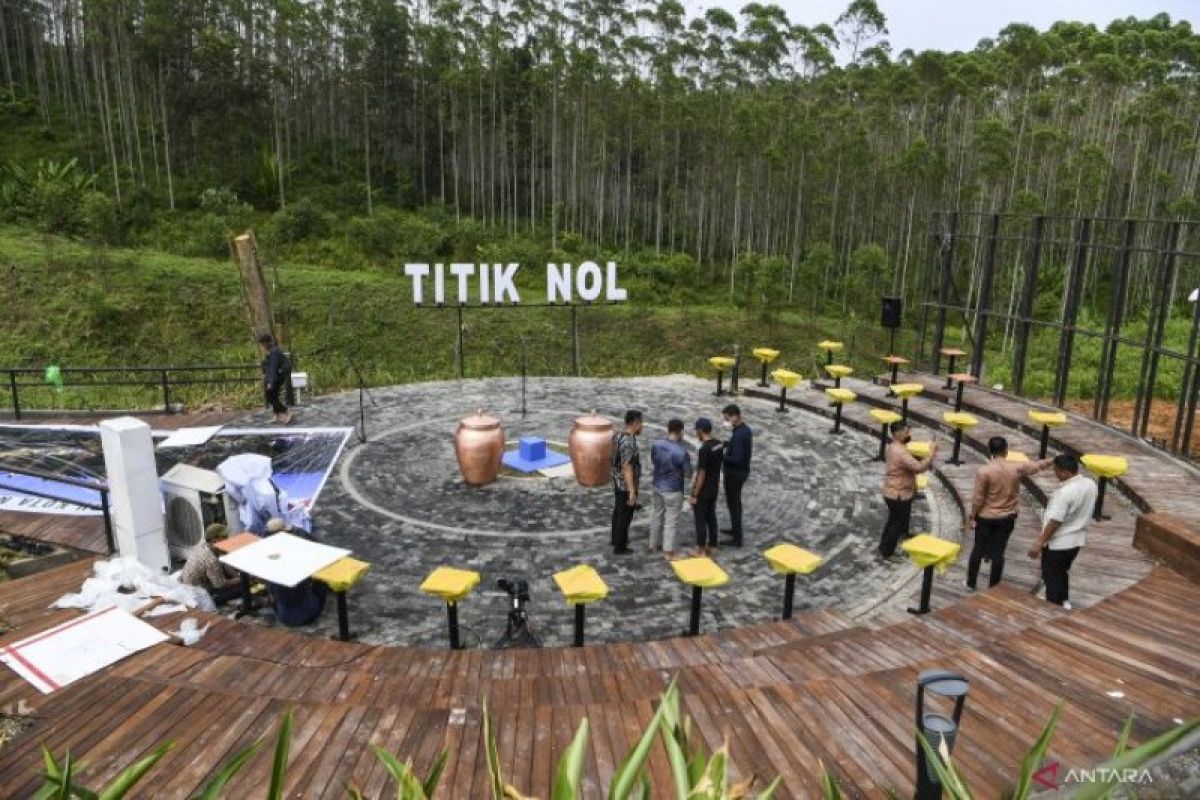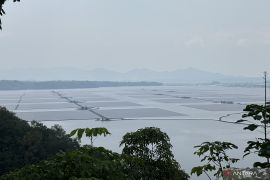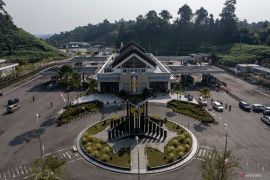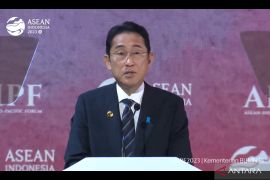. (ANTARA) - When there is no rain in East Kalimantan, fluttering dust on a dirt road in North Penajam Paser, caused by heavy vehicles moving to the new capital site, will stain passing cars in no time.
Such conditions might not recede for a foreseeable future, as they should continue moving back and forth to complete the Nusantara City by its target in 2024.
“Every time I come here, there is always something new,” Luqman, a staff at the Nusantara National Capital Authority (OIKN), usually guiding journalists touring the new capital site, stated.
At the new capital kilometer zero site where President Joko Widodo (Jokowi) once camped, for instance, a new footbridge encircles the site's amphitheater.
Meanwhile, a gazebo near the kilometer zero point provides shade for chauffeurs waiting for state officials attending events on weekdays and tourists enjoying their lunch while touring on weekends.
A sign that reads "Mixed-Use Area" has been erected at the intersection before the kilometer zero site. The site has been designated by OIKN for shops and malls that will be developed by private investors.
Further down the dirt road, other construction works are progressing as far as the eye can see.
The future Presidential Palace site is now a restricted area amid the ongoing security system development that has been kept a secret. Guests and journalists can only see the development from afar.
Meanwhile, Luqman remarked that one of the completed structures in the new capital is the accommodation for construction workers.
The accommodation complex, comprising 22 towers, is now the home of over 15 construction workers hailing from various regions nationwide.
The complex is now one of the area's main destinations, for it has a spacious canteen, with a capacity of up to 200 persons in one sitting.
Moreover, a simple yet artistic mosque was located beside the canteen. Public Works and Public Housing Minister Basuki Hadimuljono and OIKN chief Bambang Susantono often prayed there while they were in Nusantara City.
Accommodation
Following the conclusion of work for accommodation of the construction workers, the development of housing for state apparatuses, including the police and military officers, is expected to commence later this month.
The accommodation, comprising 47 12-floor flats, will be developed by the Ministry of Public Works and Public Housing. Its Rp9.4-trillion (US$622 million) budget is disbursed directly from the state budget.
Each relocated state employee will receive their respective accommodation according to position and rank. Meanwhile, the size of the smallest flat available will be 98 square meters.
Of the 47 towers, 31 will be allocated for state apparatuses, nine for Presidential Security Detail (Paspampres), and seven for military, police, and State Intelligence Agency (BIN) officers.
“There will also be another accommodation for state apparatus developed through KBPU (public-private cooperation) scheme,” New Capital Infrastructure Development Task Force Head Danis Hidayat Sumadilaga stated on another occasion.
Meanwhile, landed houses will be provided for ministers, and of the 36 planned homes, 14 have been completed. All homes are expected to be completed by June 2024 when the cabinet ministers will relocate there.
The budget for all the ministers’ houses is Rp520.46 billion (US$34.4 million). The homes are developed as a two-story 580-square meter structure, where the ground floor is for official and public purposes, and the first floor will be the residential area.
Various plants and trees, such as tropical almond (Terminalia catappa), guava, and black orchid (Coelogyne pandurata) -- East Kalimantan’s floral mascot -- would be planted at each minister’s house to make it greener and cooler.
The moving day
The relocation of state officials, state apparatuses, and police and military officers will take place once the working facilities, accommodations, and other supporting facilities in the new capital are ready.
During his visit to the new capital site last June, Administrative and Bureaucratic Reform Minister Abdullah Azwar Anas explained that the relocation would commence in 2024.
The first relocation phase will involve 11,274 state apparatuses from 40 government ministries and agencies and 5,716 military and police officers – a total of 16,990 state employees.
Meanwhile, Ministry of Communication and Informatics’ official, Farida Dewi Maharani, stated that relocating to the new capital is a great leap toward a better life.
The new capital will provide greener homes, cleaner air, and traffic congestion-free life for its residents, she affirmed.
“Moreover, the first relocated state apparatuses have also undergone selection, and they (those selected) are, indeed, privileged,” Maharani emphasized. One of their privileges is to be part of history in Nusantara City.
Moreover, OIKN Secretary Ahmad Jaka Santos Adiwijaya affirmed that public facilities to support residents’ lives, such as hospitals, schools, and markets, will be ready on their moving day to the new capital.
An international hospital would be developed in the central government area, he revealed, adding that the authority has also cooperated with educational institutions to develop quality education facilities in Nusantara City.
Adiwijaya remarked that the new capital would advance the transition from conventional energy to renewable energy, as his side is keen to prove that Indonesia’s capital relocation will not harm the environment.
“We will implement zero-emission development by planting a lot of trees (in the new capital), with saplings prepared at the nursery in Mentawir,” he stated.
That day, a slight drizzle was seen over the new capital site, clearing the air from the fluttering dirt and dust from the construction development.
As Nusantara City’s development is gradually progressing, we are moving closer to the day when we will welcome a sustainable new capital for Indonesia that will be comfortable for its inhabitants.
Related news: OIKN launches training programs for Nusantara residents
Related news: East Kalimantan develops 1.32-million hectare land for IKN agriculture










